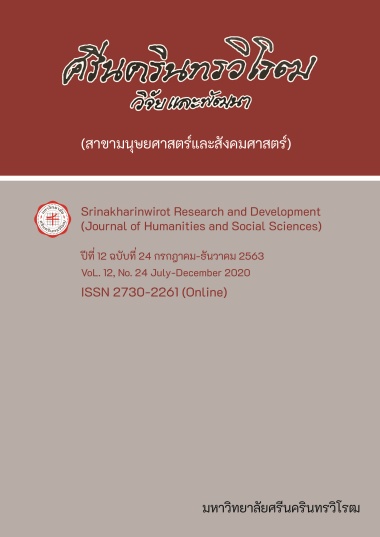การศึกษาปัจจัยจิตสังคมที่เกี่ยวข้องกับพฤติกรรมการลดน้ำหนักที่เหมาะสมของวัยรุ่น A STUDY OF PSYCHOSOCIAL FACTORS RELATED TO APPROPRIATE WEIGHT-LOSS BEHAVIORS OF ADOLESCENTS
Keywords:
Psychosocial Factors, Weight Loss Behaviors, AdolescentsAbstract
The objectives of this study were as follows (1) to examine the relationship between the psychological factors concerned ego identity and locus of control, social and situation factors including role models and media exposure, and psychological stage factors, such as attitudes to weight-loss and body image satisfaction related to weight-loss behaviors, (2) to predict to weight-loss behaviors using the psychological factor, social situation factors, and psychological stage factors. The participants were in late adolescence, consisting of 360 undergraduate students. via the stratified random sampling method. The statistics for analysis included mean, standard deviation, Pearson’s product moment correlation coefficient, and both enter and stepwise multiple regression analysis. the results of, the study were as follows. 1. Ego identity, role model, media exposure and body image satisfaction correlated positively to the appropriate weight-loss behaviors (**p > .01). The locus of control factor correlated positively with appropriate weight-loss behaviors (*p > .05). 2. The factors of ego identity, locus of control, role model, media exposure, weight-loss attitudes, and body image satisfaction in combination can predict appropriate weight-loss behaviors at 33.9% and a combination prediction of appropriate weight-loss behaviors terms of consumption at 25.6% and exercise at 26.4%. appropriate Weight-loss behaviors, consumption, and exercise as the strongest predictor of media exposure, ego identity, locus of control and attitudes
to weight-loss respectively.
Downloads
References
[2] Centers for Disease Control and Prevention. (2017). Youth Risk Behavior Surveillance - United States, 2017. Retrieved from https://www.cdc.gov/healthyyouth/data/yrbs/pdf/2017/ss6708.pdf
[3] Elena V. Zinovyeva, Tatyana V. Kazantseva, & Anna N. Nikonova. (2016). Self-esteem and Loneliness in Russian Adolescents with Body Dissatisfaction. Procedia – Social and Behavioral Sciences, 233, 367-371. doi:10.1016/j.sbspro.2016.10.160
[4] Cristi L. Kamps, & Steven L. Berman. (2011). Body image and identity formation: the role of identity distress. Revista Latinoamericana de Psicología, 43(2), 267-277.
[5] The National Eating Disorders Association’s NED Awareness Week. (2015). The War on Women's Bodies the Media, Body Hatred & Eating Disorders. Retrieved from http://newspaper.amsacs.org/a-spotlight-on-eating-disorders-and-help/
[6] Marika Tiggemann, & Amy Slater. (2017). Facebook and body image concern in adolescent girls: A prospective study. International Journal of Eating Disorders, 50(1), 80-83. doi:10.1002/eat.22640
[7] กุศลิน อินทชาญ, เบญจวรรณ โพแก้ว, พรรณธิกา เลี้ยงประเสริฐ, พิสมัย ดวงตะปะ, วรพีพร แซ่ลิ่ม, วลัยลักษณ์ อัคฮาด, และอาลิษา ศรีบุญเรือง. (2551). การศึกษาพฤติกรรมการลดความอ้วนของนักศึกษามหาวิทยาลัยราชภัฏจันทรเกษม. (รายงานการวิจัย). กรุงเทพฯ: มหาวิทยาลัยราชภัฏจันทรเกษม.
[8] วิชัย เอกพลากร. (2557). การสำรวจสุขภาพประชาชนไทยโดยการตรวจร่างกาย ครั้งที่ 5 พ.ศ. 2557. นนทบุรี: สถาบันวิจัยระบบสาธารณสุข.
[9] พินิจ ลิ้มสุคนธ์. (2551, ธันวาคม). ตายจากยาลดความอ้วน. หมอชาวบ้าน, 30(356), 10-11.
[10] Carlijn G. N. Voorend, Shane A. Norris, Paula L. Griffiths, Modiehi H. Sedibe, Marjan J. Westerman, & Colleen M. Doak. (2012). We eat together; today she buys, tomorrow I will buy the food: adolescent best friends’ food choices and dietary practices in Soweto, South Africa. Public Health Nutrition, 16(3), 559-567. doi:10.1017/S1368980012003254
[11] Anu Joki, Johanna Makela, & Mikael Fogelholm. (2017). Permissive flexibility in successful lifelong weight management: A qualitative study among Finnish men and women. Appetite, 116, 157-163. doi:https://doi.org/10.1016/j.appet.2017.04.031
[12] มารศรี ศรีบัวทอง. (2551). สาเหตุการสูญเสียเอกลักษณ์แห่งตนในผู้ป่วยโรคบกพร่องในการกิน. วิทยานิพนธ์วิทยาศาสตรมหาบัณฑิต (จิตวิทยาการให้คำปรึกษา). มหาวิทยาลัยรามคำแหง.
[13] Erik H. Erikson. (1963). Childhood and society. 2nd ed. New York: Norton.
[14] Carole A. Bisogni, Margaret Jastran, Marc Seligson, & Alyssa Thompson. (2012). How People Interpret Healthy Eating: Contributions of Qualitative Research. Journal of Nutrition Education and Behavior, 44(4), 282-301. doi:https://doi.org/10.1016/j.jneb.2011.11.009
[15] ดวงเดือน พันธุมนาวิน. (2559). สื่อทศวรรษใต้ร่มทฤษฎีต้นไม้จริยธรรม. กรุงเทพฯ: สถาบันบัณฑิตพัฒนบริหารศาสตร์.
[16] Julian Rotter. (1954). Social Learning and Clinical Psychology. Englewood Cliffs, N.J.: Prentice Hall.
[17] Albert Bandura. (2006). Autobiography in M.G. Linsey & W.M. Runyan (Eds.) (Vol. 9). Washington, D.C.: American Psychological Association.
[18] นิจนันท์ มั่นจริง. (2551). การเปิดรับสื่อ ความรู้ และการมีส่วนร่วมในปัญหาความรุนแรงต่อสตรีในเขตกรุงเทพมหานคร. วารสารศาสตรมหาบัณฑิต (สื่อสารมวลชน). คณะวารสารศาสตร์และสื่อสารมวลชน มหาวิทยาลัยธรรมศาสตร์.
[19] Mary L. Gavin. (2018). The Deal with Diets. Retrieved from https://kidshealth.org/en/teens/dieting.html
[20] Justin Healey. (2014). Positive Body Image: The Spinney Press.
[21] นงลักษณ์ วิรัชชัย. (2543). พรมแดนความรู้ด้านการวิจัยและสถิติ : รวมบทความทางวิชาการของ ดร.นงลักษณ์ วิรัชชัย. ชลบุรี: วิทยาลัยการบริหารรัฐกิจ มหาวิทยาลัยบูรพา.
[22] Joseph F. Hair, William C. Balck, Barry J. Babin, & Rolph E. Anderson. (2010). Multivariate Data Analysis: A Global Perspective. New Jersey: Pearson Prentice Hall.
[23] อุษา ศรีจินดารัตน์. (2533). พัฒนาการของเอกลักษณ์แห่งอีโก้ที่เกี่ยวกับการรับรู้คุณค่าของการทำงานและการรับรู้คุณค่าของศาสนาในวัยรุ่นไทยภาคใต้. ปริญญานิพนธ์ วท.ม. (การวิจัยพฤติกรรมศาสตร์ประยุกต์) มหาวิทยาลัยศรีนครินทรวิโรฒ.
[24] ยุภาวรรณ ดวงอินตา. (2549). การวิจัยเพื่อสร้างแบบวัดลักษณะมุ่งอนาคต ควบคุมตนสำหรับนักศึกษา. สถาบันบัณฑิตพัฒนบริหารศาสตร์.
[25] Sitsira-at, S. (2018). A Study of Psychosocial Factors Related to Preserving Thai Traditions of Undergraduate Students. International Journal of Engineering & Technology, 7(4.38), 1314-1318.
[26] สุรีรัตน์ รงเรือง. (2554, มกราคม). พฤติกรรมส่งเสริมสุขภาพของนักศึกษามหาวิทยาลัยสงขลานครินทร์ วิทยาเขตปัตตานี. วารสารพฤติกรรมศาสตร์. 17(1), 109-123.
[27] Yun Doshik, & Silk Kami J. (2011). Social Norms, Self-identity, and Attention to Social Comparison Information in the Context of Exercise and Healthy Diet Behavior. Health Communication, 26(3), 275-285. doi:10.1080/10410236.2010.549814
[28] Cobb-Clark Deborah A., Kassenboehmer Sonja C., & Schurer Stefanie. (2014). Healthy habits: The connection between diet, exercise, and locus of control. Journal of Economic Behavior & Organization, 98, 1-28. doi:https://doi.org/10.1016/j.jebo.2013.10.011
[29] ดุจเดือน พันธุมนาวิน. (2558). ปัจจัยเชิงเหตุของพฤติกรรมเสี่ยงอย่างมีสติของนักเรียนระดับมัธยมศึกษาการวิเคราะห์เส้นทางอิทธิพล. วารสารพฤติกรรมศาสตร์, 21(1), 75-94.
[30] ภัคพล นันตาวิราช. (2551). แรงจูงใจใฝ่สัมฤทธิ์ ทัศนคติต่อการออกกำลังกาย และความเชื่ออำนาจภายในตนที่พยากรณ์พฤติกรรมออกกำลังกายของนักศึกษามหาวิทยาลัยเชียงใหม่. มหาวิทยาลัยเชียงใหม่.
[31] รวีวรรณ อังคนุรักษ์พันธุ์. (2533). เอกสารคำสอนวิชา วผ 306 : การวัดทัศนคติเบื้องต้น. ชลบุรี: ภาควิชาหลักสูตรและการสอน มหาวิทยาลัยบูรพา.
[32] Jr. William C Shiel. (2018). Weight Loss: Symptoms & Signs. Retrieved from https://www.medicinenet.com/weight_loss/symptoms.htm
[33] ศศิภา โรจน์จิรนันท์, และอังคณา ขันตรีจิตรานนท์. (2559, พฤษภาคม-สิงหาคม). ความรู้ ทัศนคติ และพฤติกรรมการควบคุมน้ำหนักของนักศึกษามหาวิทยาลัยเอกชนในกรุงเทพมหานคร. วารสารศึกษาศาสตร์ปริทัศน์, 31(2), 97-105.
[34] ณัฐกฤตา นันทะสิน. (2558, มกราคม-มิถุนายน). ปัจจัยที่ส่งผลต่อพฤติกรรมการบริโภคและความภักดีต่ออาหารเพื่อสุขภาพของผู้บริโภคในเขตกรุงเทพมหานคร. วารสารกระแสวัฒนธรรม, 16
Downloads
Published
How to Cite
Issue
Section
License
Srinakharinwirot Research and Development Journal of Humanities and Social Sciences is licensed Under a Creative Commons Attribution-NonCommercial-NoDerivs 4.0 International (CC-BY-NC-ND 4.0) License, Unless Otherwise Stated. Please Read Journal Policies Page for More Information on Open Access, Copyright and Permissions.



